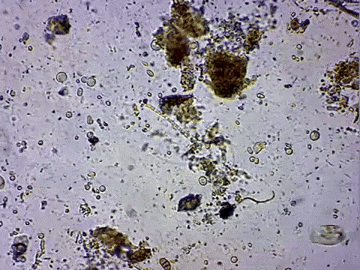Soil biology, and the good soil structures that they build, are the most crucial components of a healthy soil. “Soil Biology” refers to the large and diverse communities of microorganisms in the soil, that include viruses, bacteria, protozoa, fungi, and other organisms, tens of thousands of species.
They recycle dead plant and animal material and build up carbon in the soil, which enhances the soil’s ability to hold water and nutrients. They put some minerals such as phosphate in plant-accessible form, which plants often cannot absorb by themselves.
Not only that, but they produce countless organic compounds that plants need to ward off diseases and insects. These also give plants and fruit their resistance to insects and diseases, and taste, and are important to us for our own health and well-being. It needs an active symbiosis between plants and soil biology to produce the healthy plants we need for our own health, as shown by the Plant Health Pyramid.
Modern farming practices have led to a significant decline in soil biology worldwide. This is contributing to increasingly lower resistance in plants to diseases and insects, and too much diminished nutritional value to us. The latter is increasingly recognised as a contributing factor to many of our physical and mental illnesses.

Fortunately, over the past 30+ years, researchers and growers have demonstrated that it is possible to revitalise soil biology and regain its vital benefits.
Many of these methods are based on making compost, which can take several months to mature and requires some know-how and experience. We have developed a method to grow and boost the soil biology in seven days, on the property, when needed, and only needing simple equipment and little money – see our articles on Bio-Booster.
To then maintain and further strengthen the soil biology so that the soil’s health and structure keep improving requires adjusting the growing practices and looking after them.


